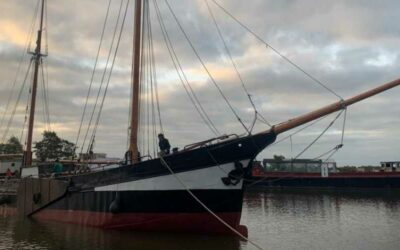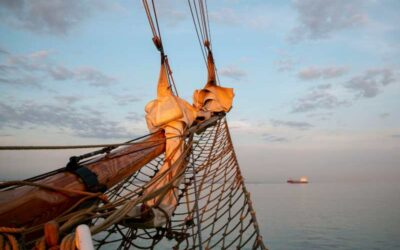For many, shipping is a single, distant event that you pay for when ordering a product online. Despite the recent grounding of the container ship Ever Given, resulting blockage of the Suez Canal and the global effect this and the COVID pandemic have had, the transport logistics system is less than transparent. It didn’t used to be this way.
In the days when sailing ships ruled the seas, with their vast spread of canvas, towering masts and the smell of tar lingering around every coastal town, shipping was integral to communities. Rather than a detached monetary add-on it wasn’t uncommon for every member of the community to have a share in a ship, so close were they to the industry.
Today, as more sail cargo businesses are starting up around the world, cargo owners, local agents and ship designers join the community. The potential of utilising wind-power and the wealth of knowledge that has been gained from the past continues to excite and inspire many.
The roles involved in shipping have shifted with the unconstrained growth of globalisation and subsequent effects on transport, from trucks to motor shipping vessels, to aeroplanes. Whilst some of the traditional role names are maintained, their responsibilities differ from those that operated in the sailing shipping industry. Below you are able to get an idea of the different roles required for the sail cargo industry.
The Shipbroker
“My word is my bond” is the age-old saying of the Shipbroker. Harbour towns would have at least one shipbrokers office. Whilst some ran their own offices; some were run from coffee-houses (such as the famous Baltic Exchange in London) and in pubs. If a ship was in port, the Master (a merchant vessel’s captain) would frequent these offices to try to “fix a cargo” for their ships. They would be greeted with the best hospitality and invited to discuss business with other ships’ Masters and the Broker themselves.
The Broker would have been a highly respected member of the community, keeping good relationships with local importers, exporters, producers, and other entrepeneurs who would be relying on their knowledge and network to transport their goods.
The Broker is the intermediary between the Owner and Merchant. It is up to the Broker to guarantee that the Merchant’s cargo is being shipped and that the ship(s) of the Owner are always sailing with the most cargoes possible.
Nowadays, the role of Broker is part and parcel of the running of a sail cargo company. Because there are few sole sail cargo Brokers, companies often take this role on themselves.
Owner
This is the owner of the ship, or a representative of the owner of the ship, sometimes called the Carrier, or more confusingly… the Ship! The Owner can be the captain or the General Agent who speaks on behalf of the owners.
The business model of the Owner is based on transporting goods for others and receiving freight in return. All running costs of the ship (crew, maintenance, stores, insurance, port fees, commission etc…) are subtracted from the freight dues, thus leaving the profit.
Agent
There are different Agents that work with different parties in the logistics system. Occasionally a Broker will take the role of Agent when expressly stated.
The Agent arranges all operational tasks which are happening around the shipment. The Owner might hire a “General Agent” to manage the ship (port arrivals, crew, ordering, marketing, administration, maintenance etc).
Crew, Owner or the General Agent might make use of the services of Local Agent to arrange tugboats, port berths or other services. The Merchant (or Broker on behalf of the Merchant) might order Local Agents to organise storage space, warehousing, clearance, import and export dues and other services.
The role of Broker in the sail cargo world today is usually integrated with Owner or Merchant. Companies such as Fairtransport and Timbercoast fix their own cargoes for their ships. Thus, they are not only Owners and Merchants, but also Brokers. New Dawn Traders is a unique business in that they do not have their own ship, and therefore are Brokers. They do have their own products too, however, so are also Merchants! Companies like Blue Schooner Company have their own products, so are Merchants, and have their own ship, so are Owners. However, they do use New Dawn Traders as Brokers.
The exciting thing about the sail cargo industry is that there is plenty of room to develop companies specifically for these roles. Until that time, the community will continue to run as is, sharing knowledge and expertise to ensure that shipping truly does become sustainable.




